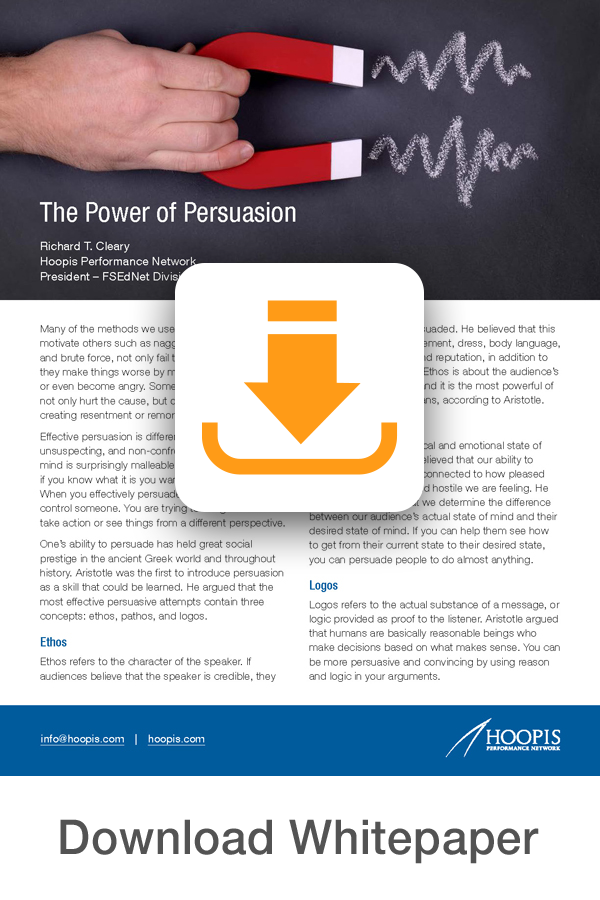The Power of Persuasion

Many of the methods we use to persuade and motivate others such as nagging, pleading, coercing and brute force, not only fail to work, but many times, they make things worse by making people mistrust or even become angry. Some persuasion tactics will not only hurt the cause, but damage relationships by creating resentment or remorse.
Effective persuasion is different. It’s subtle, unsuspecting, and non-confrontational. The human mind is surprisingly malleable and easy to manipulate, if you know what it is you want and what you’re doing. When you effectively persuade, you are not trying to control someone. You are trying to nudge them to take action or see things from a different perspective.
One’s ability to persuade has held great social prestige in the ancient Greek world and throughout history. Aristotle was the first to introduce persuasion as a skill that could be learned. He argued that the most effective persuasive attempts contain three concepts: ethos, pathos, and logos.
Ethos
Ethos refers to the character of the speaker. If audiences believe that the speaker is credible, they are more likely to be persuaded. He believed that this includes body type, movement, dress, body language, sincerity, word choice, and reputation, in addition to expertise and charisma. Ethos is about the audience’s perception of credibility and it is the most powerful of the three persuasive means, according to Aristotle.
Pathos
Pathos is the psychological and emotional state of the audience. Aristotle believed that our ability to be persuaded is closely connected to how pleased and friendly or pained and hostile we are feeling. He also recommended that we determine the difference between our audience’s actual state of mind and their desired state of mind. If you can help them see how to get from their current state to their desired state, you can persuade people to do almost anything.
Logos
Logos refers to the actual substance of a message, or logic provided as proof to the listener. Aristotle argued that humans are basically reasonable beings who make decisions based on what makes sense. You can be more persuasive and convincing by using reason and logic in your arguments.
Influence: The Psychology of Persuasion
Whether you are selling financial instruments, insurance, or boiled peanuts, the psychology behind selling, is deeply rooted in persuasion, which is influencing someone to believe or act in a specific way. Many people have observed and commented on persuasion, but Robert Cialdini is the most quoted in business and how persuasion relates to sales and marketing. In Influence: The Psychology of Persuasion, originally published in 1984, Cialdini identifies six principles of persuasion, which have been expanded by others over the years. Let’s first look at these six principles – reciprocity, scarcity, authority, consistency, liking, and consensus – and how you can apply them to prospecting and acquiring new clients.
Reciprocity
Reciprocity is a social convention that compels people to return a favor to someone who does something nice for them. You probably heard the adage, “You scratch my back, I’ll scratch yours.” Companies may send free samples of a product with the hope (and proven trackrecord) that the receiver will likely feel an obligation to buy the product. This, and offering “extras” or “bonuses,” are common examples of reciprocity. Since it’s impossible to give free samples, extras, or bonuses of insurance, stocks, and commodities, your gift to clients can be your knowledge. Consider creating video content, downloads, and e-books to attract clients on your website, or offer free workshops or webinars.
The real power of reciprocity lies in the fact that it’s such a strong social norm, and a universally expected give back. While not everyone practices reciprocity, the majority of people will, without even realizing it. Keep in mind that you should never expect reciprocity, so do it for them, not for you. Reciprocity works when there is no expectation of return because the sincerity of the gesture is what gives it its power. The need to return the favor is strongest when the initial favor was done with no expectation of repayment. Be generous and helpful as often as possible, in the hope that those you help will be on your side when you need them in the future. When used regularly, reciprocity can be an indispensable sales tool.
Scarcity
The economic principle of scarcity has been around for ages. When resources are in short supply, people want more of them. Understanding the psychology of scarcity and how it can impact decision-making can give you an additional edge in the sales process. Using the principle of scarcity to persuade others requires that you create a sense of urgency, motivating people to act. You see scarcity being used all the time in ads that say, “Selling Fast,” “Only 3 left,” and “Limited Time Only.”
In the financial services industry, salespeople can create that sense of urgency by sharing with prospects what they risk losing if they don’t act on your proposal today. Appealing to your client’s fundamental needs of shelter, love, self-esteem, and self-actualization can be very persuasive. For example, an agent/advisor selling life insurance may ask a client what will happen if he or she dies. What will happen to your family? Will they have money to survive? How will your death financially impact your family, and will they be able to maintain their lifestyle? Some agents/advisors apply this principle by limiting their availability. Don’t tell a prospective client that your schedule is “wide open.” Instead, give two options for when you “can squeeze them in.” Be careful not to create a false sense of urgency or you will lose credibility. Sincerity and truthfulness are keys to repeat business and lifelong clients.
Authority
Establishing authority and credibility that you know about the service you are providing or the product you are selling is especially important in the financial services industry. People will generally listen and act when they feel they are with credible experts.
If you speak confidently, clearly and concisely, people are more likely to listen to you, to take what you have to say seriously, and to agree with you. Prepare what you want to say and practice it. Write out your scripts and practice them regularly. When speaking, avoid filler words (such as ‘umm’, ‘err’ or ‘like’) because these suggest that you’re struggling to express your message or that you are uncertain about its validity.
Establishing authority means you must send signals to prospects about what makes you an authority before you attempt to persuade them. This also requires walking a fine line between confidence and arrogance. People don’t want to hear you boast about your accomplishments or about how smart you are. Your website and digital marketing campaigns play a valuable role in establishing authority. Providing accurate, educational content on a regular basis through video content, newsletters, and blogs, will demonstrate your knowledge to others, making it more likely that they will buy from you.
Consistency
Most people don’t like to go back on their actions or words. Once they say something, human nature will tend to make people stick to what they said, in fear of looking indecisive. Applying the principle of consistency to the sales process is about asking for small actions and commitments from prospective clients throughout the sales process, also known as the “yes ladder.” Giving them early and small opportunities to agree with you allows them to be a part of the process and makes it easier for them to give you the “big yes” later. Some people refer to this as the “foot in the door” technique since once you get your foot in the door, it’s harder for them to close it.
Your clients need to feel like they were not forced into decisions, or they may get cold feet or resent you. You can ask for commitments from prospective clients during website or in-person interaction. For example, ask for an email when you offer free content, ask a prospect to commit to a phone or office appointment, or ask a prospect to take a survey about their needs. Consistency is built through regular communication and interaction.
Liking
Prospective clients are more likely to buy from salespeople they like. Cialdini outlines three specific elements of the likability principle:
- People like those who are similar to them.
- People like those who pay them compliments.
- People like those who cooperate.
The best salespeople will take time to make a personal connection with prospects about things that have nothing to do with the product or service they are offering, either on the phone or in person. They might talk about kids, sports, television, movies, college, or any other common ground.
Applying the liking principle online is a bit trickier, and it can take more time. The single best way to create likability online is by creating an outstanding ‘About Us’ page on your website or a bio page, if you are an agent/advisor. Tell your readers about your hobbies, your core values, and why you enjoy helping and educating your clients. The more likable you are, the more people you will persuade to buy from you.
Consensus
People tend to adopt a “herd” mentality, meaning they may look to others to make decisions. This behavior is often driven by the desire to fit in. Many may think, “If they are doing XYZ, so can I.” You can apply the principle of consensus to the sales process by harnessing the power of testimonials. Whether you share videos, blog posts, or talking to a prospect in person, sharing success stories from current and previous clients inspires prospects to “jump on the bandwagon.” Another powerful way to activate consensus is through online reviews from third-party sites. Prospects searching for you online can see positive comments, encouraging them to join others who have done successful business with you.
Additional Tips and Techniques
As a spin-off from these basics’ techniques outlined by Cialdini, there are other persuasion tips and techniques which can also help you to effectively persuade others. Keep in mind that the ultimate goal of persuasion is to convince the client or prospect to adopt a new attitude as a part of their own core belief system and choose to buy from you.
Content Organization
If you carefully describe or explain things in such a way that influences how the recipient interprets the information, you are ‘framing’ that content. This technique is often used to influence audiences in political debates. The three core elements of framing include:
- Placement – Make sure you choose the right time, place and people to communicate with. Are both members of a partnership in attendance?
- Approach – Make sure you carefully construct how your argument is presented. Focus on the positives, rather than any potential downsides of an agreement.
- Words – Make sure to select the most appropriate words to explain your viewpoint. Mark Twain once said, “The difference between similar words and the right words is the difference between lightning and the lightning bug.” Choose your words wisely. An example of this is the difference between using the words “cheap” and “inexpensive.” It is important to frame your words to say how you want your client to feel.
Go Big and Then Small
This approach is the opposite of the “foot in the door” approach or “consistency” principle. A salesperson will begin by making a large and possibly unrealistic request. The individual responds by refusing. The salesperson then responds by making a much smaller request, with may often come off as conciliatory. People often feel obligated to respond positively to these offers. Since they refused that initial request, people often feel compelled to help the salesperson by accepting the smaller request.
Anchor Points
The anchoring bias is a technique that can have a powerful influence when negotiating or selling. Basically, your first offer has the tendency to become an anchoring point for all future negotiations. An example of this is if you are trying to sell an insurance policy. If you suggest a larger policy first, that larger policy will become the anchoring starting point for your client’s decision. While you might not sell a policy that large, starting high might lead you to getting a higher sale.
“But You Are Free”
By simply reminding those who you’re talking to that they are free to make their own decision on whatever the topic you’re discussing, will make them more comfortable and feel less pressured. This is a highly effective strategy that is easy to implement.
Body Language
Never underestimate the power of your body language, which has a significant impact on your ability to persuade:
- Smile naturally. This will make you seem approachable and likeable.
- Raise your eyebrows. This signals you are not a threat, and gives the impression that you are friendly and approachable.
- Avoid crossing your arms and putting your hands in your pockets. These are “closed” positions and they signal that you are not flexible, comfortable, or approachable.
- Use eye contact. Making regular eye contact shows an interest in the conversation and the person you are talking to. You will also appear as more trustworthy.
- Show your palms. This technique goes back to the cave men days when the first thing we need to verify is that the visitor is not holding a weapon. No matter how far this dates back, it still indicates you are telling the full story.
Clothing
While these may seem subconscious, they have proven important and effective in aiding persuasion.
- Show your neck. This indicates that you are unthreatening and easy to approach.
- Color. Make a special attempt not to clash with your environment. Wear colors that soften your look without weakening you. Wear colors that make you feel confident.
- Professionalism. While it’s important to establish authority through your clothing, you don’t want to appear to be inflexible or inappropriate for the situation in which you are meeting.
Conclusion
Persuasion is not a new concept but is one that is used in advertisements and conversations every day. Techniques for improving your ability to persuade others are likely to make you more successful. Keep in mind Zig Ziglar’s words, “The most powerful persuasion tool you have in your entire arsenal is your integrity.



